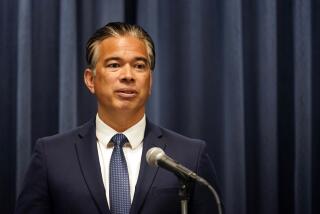Keating Takes Stand at Lincoln S&L; Hearing : Thrifts: The embattled financier appears unruffled as he argues that the federal government encouraged S&Ls; to move into non-traditional investments.
- Share via
WASHINGTON — Embattled Arizona developer Charles H. Keating Jr. defended his five-year operation of Lincoln Savings & Loan Thursday, testifying that his firm bought the Irvine thrift to take advantage of deregulation laws he saw as the “salvation of the industry.”
Appearing relaxed and confident, Keating told U.S. District Judge Stanley Sporkin that he assembled a top-notch legal and accounting team to run Lincoln and to make sure the Orange County institution complied with federal and state rules.
Instead, Keating is now accused of systematically violating those rules and orchestrating risky investments that contributed to Lincoln’s colossal failure last April.
The flamboyant businessman has become a lightning rod for an industrywide debacle expected to cost taxpayers more than $200 billion. Lincoln’s collapse alone could become the nation’s biggest S&L; failure, with a potential cleanup cost of more than $2 billion.
Keating’s testimony, which will continue today, came during the fifth day of a court hearing designed by Sporkin to test the evidence used by federal regulators to justify their April 14 takeover of Lincoln.
The court hearing focuses on four transactions identified by regulators as representative of the failure of Lincoln’s former parent firm, American Continental Corp. in Phoenix, to operate the S&L; safely and soundly and conserve assets.
American Continental filed for bankruptcy protection April 13, the day before the federal seizure. The company sued regulators a week later, claiming that they lacked sufficient evidence to show that Lincoln was being operated unsafely and unsoundly and was substantially dissipating assets, the grounds cited for the takeover.
Sporkin is the first judge to review the merits of some of the longstanding differences between regulators and American Continental executives. And Keating, who has given only a handful of interviews since the collapse and refused to testify at a House Banking Committee hearing in November, appeared eager to tell his story in a court forum.
On Thursday, however, he testified mainly about the years he spent in Cincinnati as a lawyer and a businessman and his arrival in Phoenix to take over a struggling home-building firm. He transformed that firm into American Continental and built it into one of the nation’s largest home builders before buying Lincoln in early 1984.
Keating said industry deregulation, which allowed thrifts to engage in risky transactions that previously had been off limits, prompted him to buy Lincoln. Deregulation was advocated by the Reagan Administration and approved by Congress in 1982.
“I saw the changes in the S&L; industry . . . as being the salvation of the industry,” Keating testified, saying there was “government encouragement” to engage in land development and other non-traditional investments.
To that end, he said, he used Lincoln to plan and partially develop large tracts of land, which the S&L; then sold to home builders for immediate construction or to land speculators who intended to cash in on the expected appreciation of the land.
Lincoln was a particularly good vehicle to engage in major undertakings such as land planning and development, Keating said, because it provided easy access to the large amounts of capital needed to finance the projects.
But that capital came in the form of federally insured customer deposits, and regulators criticized Lincoln for using those funds on risky ventures--especially without proper documentation showing that the deals were safe and sound.
The two land deals that are part of the four transactions being reviewed by Sporkin were sales to land speculators, Keating said. As such, the deals were handled differently than normal loans.
Keating testified that he had hired about 50 accountants throughout the company and had 15 lawyers on staff to make sure that Lincoln complied with state and federal thrift regulations.
More to Read
Inside the business of entertainment
The Wide Shot brings you news, analysis and insights on everything from streaming wars to production — and what it all means for the future.
You may occasionally receive promotional content from the Los Angeles Times.










